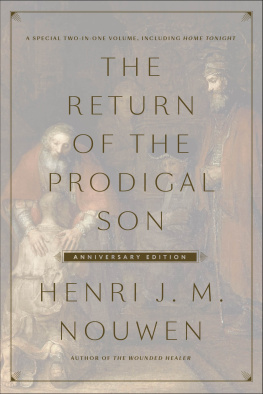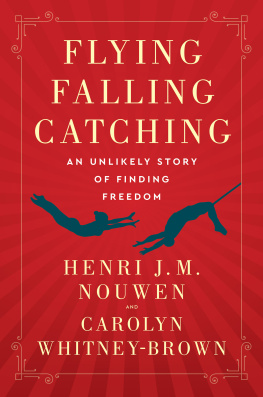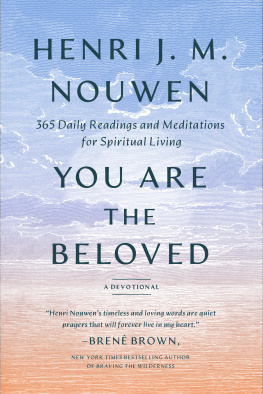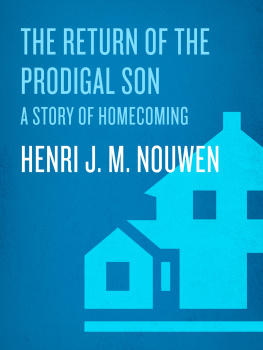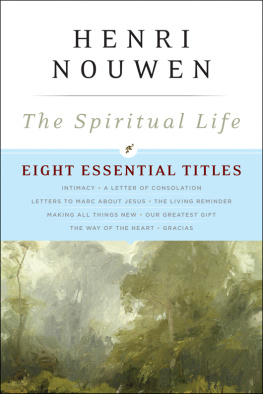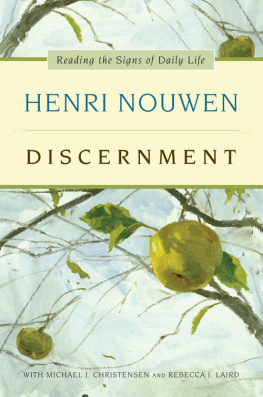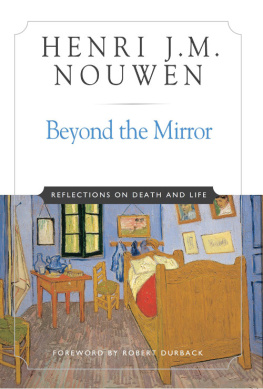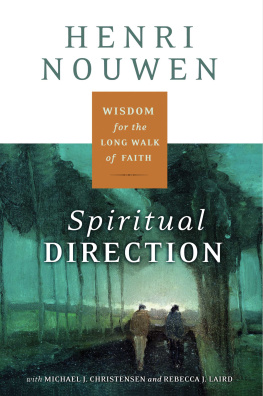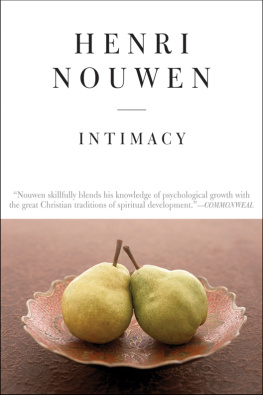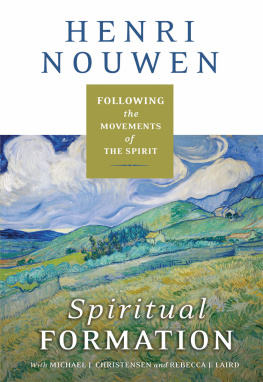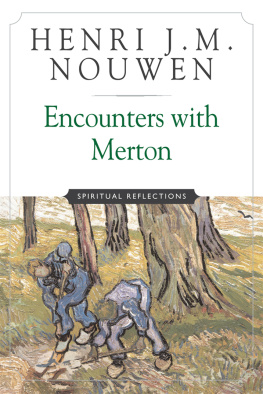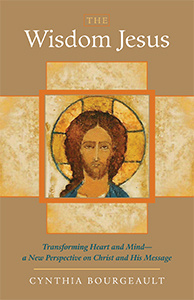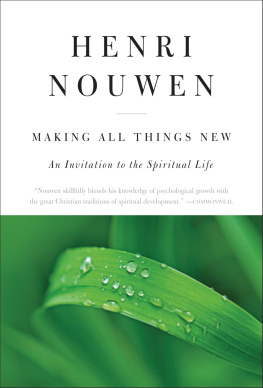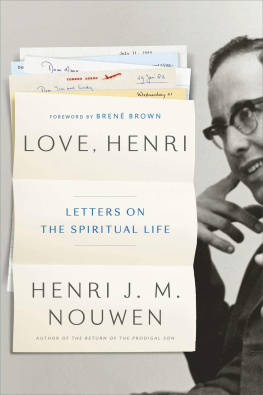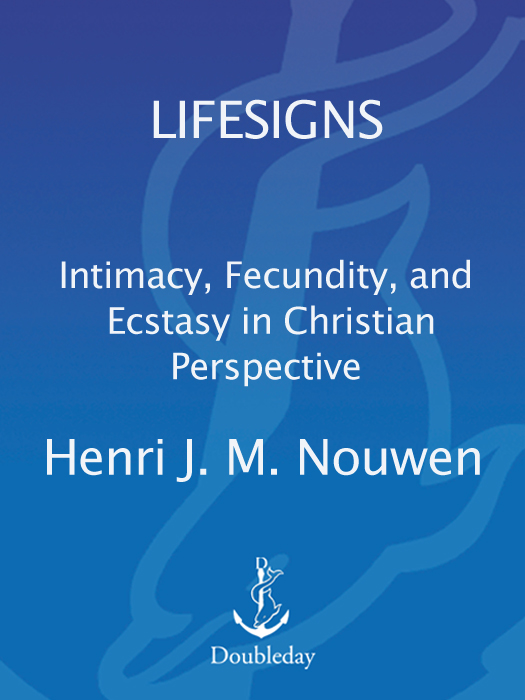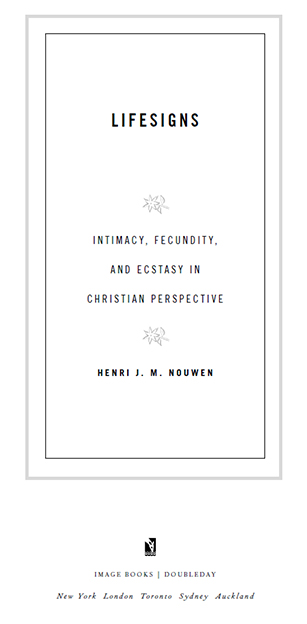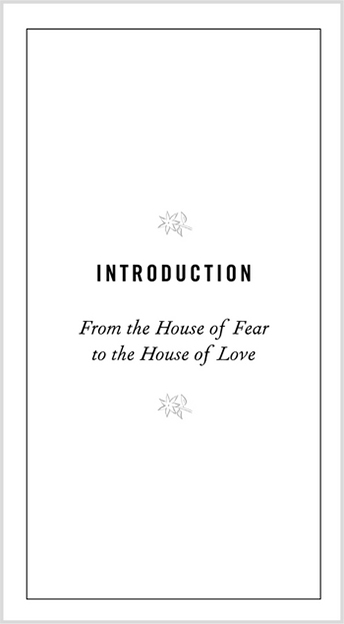A N I MAGE B OOK
PUBLISHED BY DOUBLEDAY
a division of Random House, Inc.
IMAGE, DOUBLEDAY , and the portrayal of a deer drinking from a stream are
registered trademarks of Random House, Inc.
Biblical excerpts from The Jerusalem Bible, copyright 1966 by
Darton, Longman & Todd, Ltd., and Doubleday.
Used by permission of the publisher.
Excerpts from An Interrupted Life: The Diaries of Etty Hillesum
19411943, by Etty Hillesum, translated by Arno Pomerans.
Translation copyright 1983 by Jonathan Cape, Ltd.
Reprinted by permission of Pantheon Books, a Division of
Random House, Inc.
The Library of Congress has cataloged the
1986 Image Books edition as follows:
Nouwen, Henri J. M.
Lifesignsintimacy, fecundity, and ecstasy in Christian perspective.
1. Spiritual lifeCatholic authors. I. Title.
BX2350.2N673 1986 248.4B2 86-4572
eISBN: 978-0-8041-5209-9
Copyright 1986 by Henri J. M. Nouwen
All Rights Reserved
This Image Books Edition September 2003
v3.1
TO MADAME PAULINE VANIER
ACKNOWLEDGMENTS
This book has not been written in isolation. Many people have given me much encouragement, support, and assistance. I want to express here my sincere thanks to all of them.
My first word of thanks is to Jean Vanier, who gave me the central themes of this book, introduced me to lArche, and encouraged me in my writing. I am deeply grateful for his inspiration, friendship, and generous support.
Most of this text was written during visits to the lArche community in the small French village of Trosly-Breuil. I found there not only the necessary time and space, but also the caring and prayerful milieu which is needed to write about the life of the Spirit. A special word of thanks goes to Barbara Swanekamp, who constantly reminded me that wasting time with God and the poor people of God is essential for spiritual writing, and to Simone Landrien, who helped me to see in more than one way the mysterious presence of God among the little ones. Their friendship and personal interest in my work has been a very important source of inspiration for me.
The manuscript of this book has gone through many phases. The efficient and careful secretarial work of Margaret Studier and Gerri Burke Wright enabled the manuscript to move through these phases without interruption, and allowed a series of short reflections to grow into a book. I am grateful to both of them.
As in almost all of my previous publications, Philip Zaeder has been of great help. His numerous literary suggestions give me much to be grateful for. In addition, my editor Robert Heller offered much valuable help during the last phase of this book.
Finally and most emphatically, my thanks go to my friend and co-worker Peter Weiskel, who has done most of the work to prepare this book for publication. While I wrote in Trosly, Peter managed things in Cambridge. He coordinated the typing, did most of the editing, and saw that all details were attended to. Without his competence, patience, and perseverance, this book could not have been completed.
I dedicate this book to Madame Pauline Vanier, Jean Vaniers mother. Her gracious hospitality, her affection for handicapped people and their assistants, her vital interest in world affairs, her strong faith in a loving God, and her very personal friendship and support have showed me most concretely the lifesigns described in this book.
CONTENTS
We are fearful people. The more people I come to know and the more I come to know people, the more I am overwhelmed by the negative power of fear. It often seems that fear has invaded every part of our being to such a degree that we no longer know what a life without fear would feel like. There always seems to be something to fear: something within us or around us, something close or far away, something visible or invisible, something in ourselves, in others, or in God. There never seems to be a totally fear-free moment. When we think, talk, act or react, fear always seems to be there: an omnipresent force that we cannot shake off. Often fear has penetrated our inner selves so deeply that it controls, whether we are aware of it or not, most of our choices and decisions.
In many, often very subtle ways fear victimizes and controls us. Fear can make us upset and angry. It can drive us into depression or despair. It can surround us with darkness and make us feel close to destruction and death. Fear can become so intolerable that we are willing to do anything to be relieved from iteven kill ourselves. It not seldom appears as a cruel tyrant who takes possession of us and forces us to live in his house. In fact, most of us people of the twentieth century live in the house of fear most of the time. It has become an obvious dwelling place, an acceptable basis on which to make our decisions and plan our lives.
But why are we so terribly afraid? Why is it so hard to find fearless people? Would there be so much fear if it was not useful to somebody? I have raised these questions ever since I became conscious of the gripping fear in myself and others. Gradually, I began to see the simple fact that those I feared had a great power over me. Those who could make me afraid could also make me do what they wanted me to do. People are afraid for many reasons, but I am convinced that the close connection between power and fear deserves special attention. So much power is wielded by instilling fear in people and keeping them afraid. There are so many fearful children, fearful students, fearful patients, fearful employees, fearful parents, fearful ministers, and fearful believers. Nearly always, a threatening figure stands behind them and holds them under control: a father, a teacher, a doctor, a boss, a bishop, a church or God. Fear is one of the most effective weapons in the hands of those who seek to control us. As long as we are kept in fear we can be made to act, speak, and even think as slaves.
The agenda of our worldthe issues and items that fill newspapers and newscastsis an agenda of fear and power. It is amazing, yes frightening, to see how easily that agenda becomes ours. The things and people we think about, worry about, reflect upon, prepare ourselves for, and spend time and energy on are in large part determined by a world which seduces us into accepting its fearful questions. Look at the many if questions we raise: What am I going to do if I do not find a spouse, a house, a job, a friend, a benefactor? What am I going to do if they fire me, if I get sick, if an accident happens, if I lose my friends, if my marriage does not work out, if a war breaks out? What if tomorrow the weather is bad, the buses are on strike, or an earthquake occurs? What if someone steals my money, breaks into my house, rapes my daughter, or kills me? Listen also to the many how questions: How can I raise children in a world threatened by total destruction? How can I prevent another conflict, another war, or a nuclear holocaust? How can I keep the Russians from coming too close? How can I succeed on my own as an adult? How can I keep my good name among my neighbors? How can I make it to heaven?


